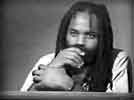Mumia Abu-Jamal from death row:
The vampire’s freedom
Published Oct 17, 2006 11:10 PM
Taken from a Sept. 21, 2006, audio
column
The words
“freedom” and “democracy” spilled like water from a
fountain.
If they were not spoken at the
United Nations, they might have more
resonance.
If they were spoken by
someone other than the American president, George W. Bush, they might provoke
more than dismissal.
But they
were.
U.S. President Bush lectured to
the U.N. delegates with a tone and turn of phrase that almost suggested that the
panorama arrayed before him were
schoolchildren.
He spoke of U.S. efforts
to “defend civilization” and, pointedly, glaringly claimed, “We
respect Islam.”
He told Iranian
delegates, “The U.S. respects
you.”
It seemed incredible, almost
vaudevillian. Some global delegates peered at the U.S. president in disbelief.
Others wore smiles that seemed ripe to burst into guffaws any
minute.
It seemed ridiculous because the
words contrasted so strongly with the world we all know: the glaring failures in
Iraq; the Taliban resurgence in
Afghanistan.
Diplomats are trained to,
well, use diplomacy and tact.
Their
faces were immobile masks hiding inner words locked within minds like,
“Can you believe this guy?” or “Freedom? Democracy?
Yeah—right!” Such words might’ve had more power had not Iraq
been the plummeting disaster that it
is.
And U.S. puppets installed in Middle
East countries? They are both enormously unpopular in their new so-called
‘democracies’ and fear their own people more than anything
else.
When empires speak of
“freedom,” they don’t mean the freedom of their subject
peoples. They mean the freedom of their elites to pluck from the stocks of the
poor and the powerless.
It’s the
freedom to feed upon those whom they see as their imperial
prey.
It’s the false
“freedom” of
vampires.
Writer Jerry Fresia captured
the spirit of that kind of imperial freedom in “Toward an American
Revolution” (Boston: South End Press, 1988), where he quotes the
late U.S. State Department honcho, George Kennan, telling Latin American
ambassadors that America’s major foreign policy concern was “the
protection of our raw materials.” (Notice the imperial “our.”)
Kennan also criticized the idea that governments have to care about the
“welfare” of the people. Fresia
writes:
“This condemnation of the
idea that government has a direct responsibility for the welfare of the people
captures wonderfully the legacy of the vision of empire and the Lockean notion
of rights: 1) The globe is up for grabs. It is all potentially private property,
suitable for development. You are free to try and acquire it and if you do, you
own it. And what you do with it once you own it is up to you. It’s your
right, unless, that is, 2) a group of people, Church-based groups, unions, or
popular coalitions who believe in community more than in free enterprise, gain
control of a government and define limits to acceptable individual activity in
accord with ethical standards. 3) The greatest threat to private power (free
enterprise, the market system, contracts, production for profit and private
ownership of productive property) has primarily been public power (a government
controlled by common people for the welfare of the common people in the
interests of community).” [pp.
81-82]
Even with the megaphones of the
corporate media and the vaunted power of the presidential bully pulpit,
Bush’s message got swamped by something far more powerful.
Truth.
Like a latter-day Orwell, his
words evoked something quite unlike what was
intended.
When he said
“freedom,” people thought “secret CIA
prisons.”
When he said
“democracy,” people thought
“puppets.”
When he said
“liberty,” people thought
“occupation.”
When he said
“human rights,” people thought “Abu
Ghraib.”
When he said “We
respect Islam,” people thought of piles of naked Muslim men in Iraq, or
men chained to the floor at the U.S. prison at Guantánamo Bay in Cuba.
They thought of the many, many people who are caged in immigration prisons on
pretextual charges, and others sent for rendition to repressive regimes
throughout the Arab world. They thought of U.S. support for these regimes for
decades.
Bush is shouting, but no one
hears him.
Go to
www.prisonradio.org
to hear Abu-Jamal’s audio columns.
Articles copyright 1995-2012 Workers World.
Verbatim copying and distribution of this entire article is permitted in any medium without royalty provided this notice is preserved.
Workers World, 55 W. 17 St., NY, NY 10011
Email:
[email protected]
Subscribe
[email protected]
Support independent news
DONATE


